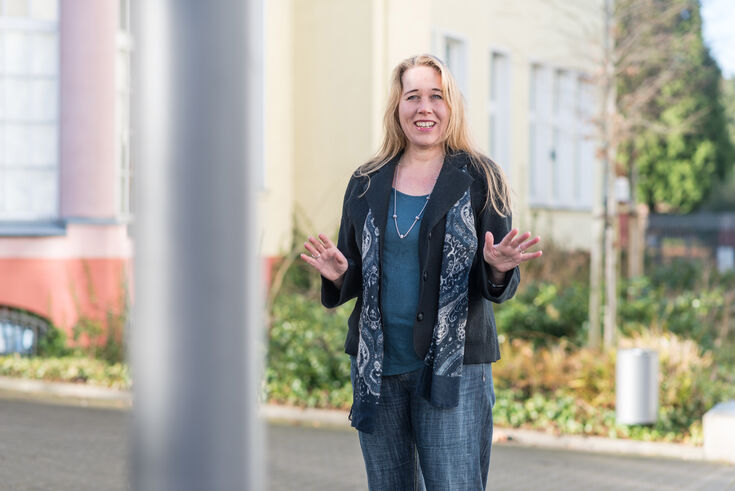Energy transition yes, but faster, more socially just and more participatory - this is the conclusion of a nationwide, representative survey. Whether people are for or against measures depends above all on the opinion of their environment.
From 2019 to 2022, The Hochschule Niederrhein (HSNR) and five other partner institutes from science and practice conducted intensive research on the study "Demokon - A Democratic Conflict Culture for the Energy Transition." The project team surveyed residents nationwide and additionally from regions that are directly affected by energy transition measures - and thus harbor conflict potential.
Even though climate protection is important to most of them, there are concerns and even resistance to the construction of new wind turbines, power lines or the phase-out of coal mining in many places. The project, funded by the Mercator Foundation, focuses on citizens who have not yet been actively involved in local disputes ("uninvolved"). The result is a picture of their attitudes, their reasons, their concerns, their demands and how their opinions are influenced by populism - with exciting insights.
One of the authors is Beate Küpper from HSNR. The deputy director of the So.Con Institute there has focused her attention on the Rhenish mining region, which includes Mönchengladbach. The region around Heinsberg is undergoing a real structural change, not least due to the planned end of lignite-fired power generation.
The result of the study: In principle, people see climate change as a major threat (80 percent) and are therefore prepared to make changes. Seventy percent are in favor of the energy turnaround, and only a few (8%) are against it. The rest (22%) are ambivalent about it.
Criticism of implementation
There is therefore less criticism of whether, but of how:58 percent of the representative nationwide respondents are dissatisfied: they demand a faster and decentralized energy turnaround, more participation and a fairer distribution of the burden. Opponents say the measures are too slow, too expensive and socially unfair. Locally, people worry about not being involved, but also fear that the energy transition will be slowed down by protests and other forms of resistance to new plants.
Sociodemographic factors such as education, income, gender or the urban-rural divide hardly play a role in attitudes toward the energy transition, but age, political attitudes and party preferences do.
A look at the regions
In regions that are particularly affected by the energy transformation, rejection is somewhat greater - with clear local differences: In the Rhenish coalfield, 16 percent of respondents reject the energy transition; in the lignite region of Lausitz in eastern Germany, the figure is more than twice as high (34%). In areas where large power lines are being laid, 17 percent are opposed, and 21 percent in areas with many wind turbines.
Interestingly, significantly more respondents believe that other residents are opposed to the energy transition. In reality, however, there are far fewer of them. In the Rhineland region, 28 percent of those surveyed assume that the people in their area are against it, while in Lusatia the figure is as high as 48 percent. "That means the country is actually more progressive than people themselves assume. We have already seen this in other studies in a very similar way with other topics such as immigration and marriage for all," says Prof. Beate Küpper.
Role of populism
This finding shows how much people base their opinions on others. Those who believe that the majority in their own community is against an energy transition project find it harder to express a positive or ambivalent attitude. "The number of opponents is also overestimated because the opponents are louder - and they are louder not least because they feel supported by the supposed majority in their region. But that's where they're wrong," concludes Küpper.
However, the study also showed that those who have not yet actively participated in the local debate could not be mobilized by supporters or opponents to do so later on.
Rejection stems not least from a tendency toward populism, as the findings underscore. 22% of the respondents insinuate: "The energy turnaround is a project of left-green elites," 19% believe: "Through the wind expansion, entrepreneurs and politicians only want to enrich themselves," and 51% fear: "The small people pay the bill for the energy turnaround." At the same time, only 8% demand, "We should return to the proven energy supply."
Almost one in five tends toward such "energy turnaround populism." In the Rhineland region, their share of 15 percent is lower than this nationwide prevalence, while in Lusatia it is higher at 36 percent.
For more information, visit www.demokon.de.
To the study:
Project partners: Potsdam Institute for Climate Impact Research (lead), Institute for Democracy Research at the University of Göttingen, Institute for Transformative Sustainability Research (IASS) Potsdam, University of Siegen, Institute for Space and Energy in Wedel near Hamburg, and Hochschule Niederrhein.
Sponsor: Mercator Foundation
Surveys: on-site and online, total of about 4,000 respondents nationwide.
Period: 2019-2022. The survey was before the Russian war of aggression against Ukraine and the associated new challenges for energy supply.


















